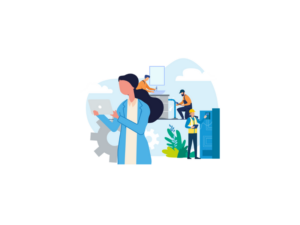What is an IWMS system?
Managing large-scale workplace operations efficiently and effectively is crucial for enterprises in today’s fast-paced business world. Many organisations are turning to Integrated Workplace Management Systems (IWMS) to streamline and integrate various aspects of their workplace.
From managing extensive lease portfolios and the compliance headaches they bring to genuinely understanding the space and resources you need in the workplace, an IWMS brings a robust set of tools designed to consolidate and optimise essential processes related to real estate, facilities, maintenance, and resources.
In this blog we will delve into the intricacies of IWMS and explore its significance in modern workplaces.
What is an integrated workplace management system (IWMS)?
An Integrated Workplace Management System (IWMS) is a comprehensive software platform that combines multiple functionalities to streamline and automate various aspects of workplace management. IWMS systems provide a centralised database and interface for handling diverse activities, including facility management, maintenance, real estate lifecycle management, capital project management, and resource management. By integrating these functionalities into a single platform, IWMS systems enable organisations to enhance operational efficiency, improve decision-making, and optimise resource allocation.
Why is an IWMS system important for enterprises?
A successful enterprise organisation must ensure efficient space utilisation, maintain a comfortable and productive environment, handle maintenance and repairs, and make informed decisions about real estate investments.
An IWMS system plays a pivotal role in addressing these challenges by providing a holistic approach to workplace management. By consolidating data, automating processes, and facilitating data-driven decision-making, IWMS systems empower enterprises to optimise their resources, enhance operational efficiency, and reduce costs.
Functional areas of an IWMS system
IWMS systems cover various functional areas that are crucial for effective workplace management. Let’s explore some of the critical areas where IWMS software proves invaluable:
Facilities management
IWMS systems offer comprehensive tools and functionalities to streamline facilities management. This includes space utilisation management, asset tracking, lease administration, move management, and workplace services. By centralising data and automating processes, IWMS software enables enterprises to optimise space allocation, improve occupancy rates, enhance workplace experience, and ensure compliance with regulations.
Facilities maintenance
Maintaining a well-functioning workplace is essential for productivity and employee satisfaction. IWMS systems provide features for managing preventive and reactive maintenance, work order management, vendor management, and asset lifecycle tracking. Organisations can proactively address issues, reduce downtime, extend asset lifespan, and optimise maintenance costs by automating maintenance processes.
Real estate lifecycle management
Real estate is a significant investment for organisations, and effectively managing it is crucial for optimising returns. IWMS systems offer capabilities for real estate portfolio management, lease administration, space planning, site selection, and financial analysis. IWMS software enables organisations to make informed decisions, minimise risks, maximise space utilisation, and optimise lease agreements by providing real-time insights into real estate assets.
Capital project management
From small renovations to large-scale construction projects, capital projects require careful planning, execution, and monitoring. IWMS systems assist enterprises in managing project timelines, budgets, resource allocation, vendor coordination, and progress tracking. By providing transparency and control over capital projects, IWMS software helps organisations complete projects on time, within budget, and with minimal disruptions to daily operations.
Resource management
Efficiently managing resources such as equipment, vehicles, and personnel is essential for seamless operations. IWMS systems offer features for resource scheduling, tracking, and utilisation analysis. By optimising resource allocation, IWMS software enables organisations to reduce costs, improve productivity, and efficiently utilise assets and personnel.
What are the benefits of an IWMS system?
Implementing an IWMS system can bring a wide range of benefits to enterprises. We’ve grouped some of the critical advantages into three areas real estate management, workplace management, and operations management.
Real estate management:
- Efficient lease administration: With IWMS software’s lease administration functionality, organisations can gain a holistic view of their lease portfolio, review lease commitments, and ensure compliance. This streamlines lease management processes, reduce administrative burdens, and helps organisations make informed decisions about lease agreements. A real-world example could be a multinational corporation using IWMS lease administration software to track and manage leases across multiple locations, ensuring they meet their lease obligations and optimising their real estate portfolio for maximum efficiency, scalability and profitability.
- Robust lease accounting: IWMS systems equipped with lease accounting software enable organisations to meet the guidelines set by accounting standards such as AASB, FASB, and GASB. By automating lease accounting processes, organisations can improve financial management, enhance accuracy in reporting, and streamline lease-related financial operations. You can leverage IWMS lease accounting software to ensure compliance with accounting standards, accurately calculate lease expenses, and provide transparent financial information to your stakeholders.
- AI-Powered lease abstraction: IWMS solutions with AI-powered lease abstraction capabilities offer advanced data extraction, analysis, and consumption from commercial leases. This technology-driven approach enhances the audibility, transparency, and accessibility of lease data, enabling organisations to make data-driven decisions and optimise lease-related processes. Lease abstraction software makes it a breeze to extract critical lease data, analyse lease terms and conditions, and gain valuable insights into their lease portfolio, facilitating strategic decision-making and powerful risk management.
Workplace management:
- Practical space management: With many offices and workplaces now having reduced staff on-site on any given day, it’s essential to understand your spaces’ impact on employee performance and your revenue and portfolio. IWMS software provides powerful space management tools for visualising floor plans, optimising workspace utilisation, and reducing occupancy costs. By efficiently managing space allocation, organisations can enhance collaboration, improve employee experience, and maximise available space to create a more collaborative and productive work environment and reduce costs in a tight market.
- Seamless room/desk booking: With space management comes effective resource allocation for your team and contractors. Integrated workplace management software offers user-friendly meeting room and desk booking software that can be accessed via desktop or mobile devices. By simplifying reserving and managing workspaces, you’ll improve productivity amongst your team, reduce conflicts in selecting the coveted meeting rooms, and enhance overall workplace efficiency with streamlined collaboration. If your organisation offers flexible work arrangements, room and desk booking software enable employees to easily find and reserve available desks or meeting rooms, making it simple for those on-site to utilise the resources you offer them to complete the job.
- Efficient people presence management: Understanding who works on-site and remotely is paramount in keeping your workplace safe and secure. Large-scale enterprise organisations have a vast array of IP they wish to protect, from essential data to the teams that work in their buildings daily. IWMS systems with people presence management tools, including kiosks and apps, help organisations manage employees, visitors, and contractors from pre-visit compliance to on-site access and tracking. This ensures a secure and controlled environment while simplifying visitor management processes and freeing the front desk and reception teams to fulfil the many other duties in their busy work schedule. By monitoring visitor and contractor movements, you can effortlessly maintain a high level of security and compliance and ensure only those who should be on-site gain access to your organisation.
Operations management:
- Proactive facilities management: IWMS software offers proactive facilities management capabilities for preventive and ad hoc maintenance, asset lifespan optimisation, and cost minimisation. Organisations can reduce downtime, extend asset lifespan, and minimise ownership and operation costs by automating maintenance processes. An example would be a hospital that can use IWMS facilities management software to proactively schedule maintenance tasks, ensure the smooth operation of critical medical equipment, and minimise disruptions to patient care.
- Energy & sustainability optimisation: IWMS systems with energy and sustainability features or modules significantly benefit organisations looking to reduce energy costs, improve environmental sustainability, and enhance workplace health and occupant well-being. Organisations can achieve significant cost savings by monitoring energy consumption, identifying inefficiencies, and implementing sustainable practices while demonstrating their commitment to environmental responsibility. By monitoring energy usage across your portfolio, you’ll locate high-consumption areas, highlighting where and how to implement energy-saving measures while tracking positive progress towards your organisation’s and the government’s sustainability goals.
- Efficient project management: IWMS software provides deep financial functionalities for all phases of project management. By integrating project management capabilities, organisations can effectively plan, execute, and monitor projects, ensuring they are completed within budget and timelines. An example is a construction company using IWMS project management tools to track project costs, allocate resources, monitor project progress, and streamline stakeholder communication, leading to successful project delivery and improved profitability.
By utilising IWMS solutions in real estate, workplace, and operations management, organisations can optimise their processes, improve efficiency, reduce costs, and create a productive and sustainable work environment.
FAQ
Want to know more?
MRI Software has gone a step beyond the IWMS with our extensible workplace management solution, or as we call it – the XWMS. An open and connected solution that gives you the ability to add different aspects of the workplace system when you need them, providing total scalability.
We’ve compiled a detailed guide on what to look for in an IWMS, how to implement it in your organisation, the advantages of adopting an XWMS and practical guidance on easy implementation.
Whether you’re a facilities or workplace manager, it’ll help you understand the potential of the software and how it can be utilised to enhance the productivity and efficiency of your organisation.
Discover the key trends and challenges facing Facility Managers
Join us for an on-demand webinar that delves into the ever-changing landscape of facility management. Hosted by Heinrich Serfontein, Industry Principal FM from MRI Software and featuring a special guest speaker, Richard Fennell, Australian Head of Pr…

